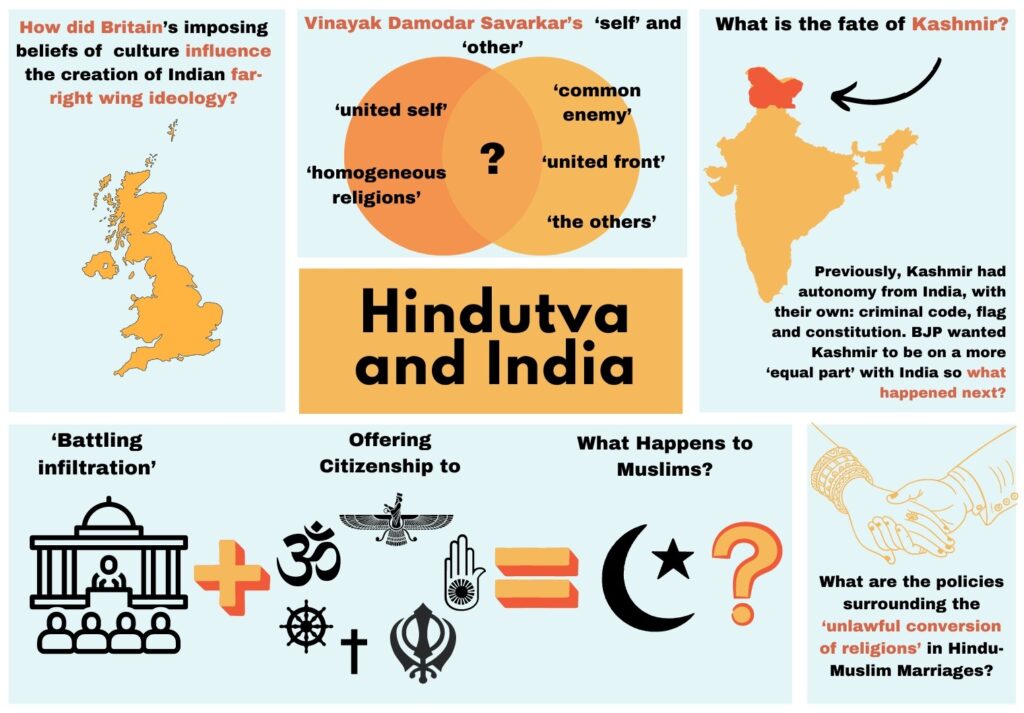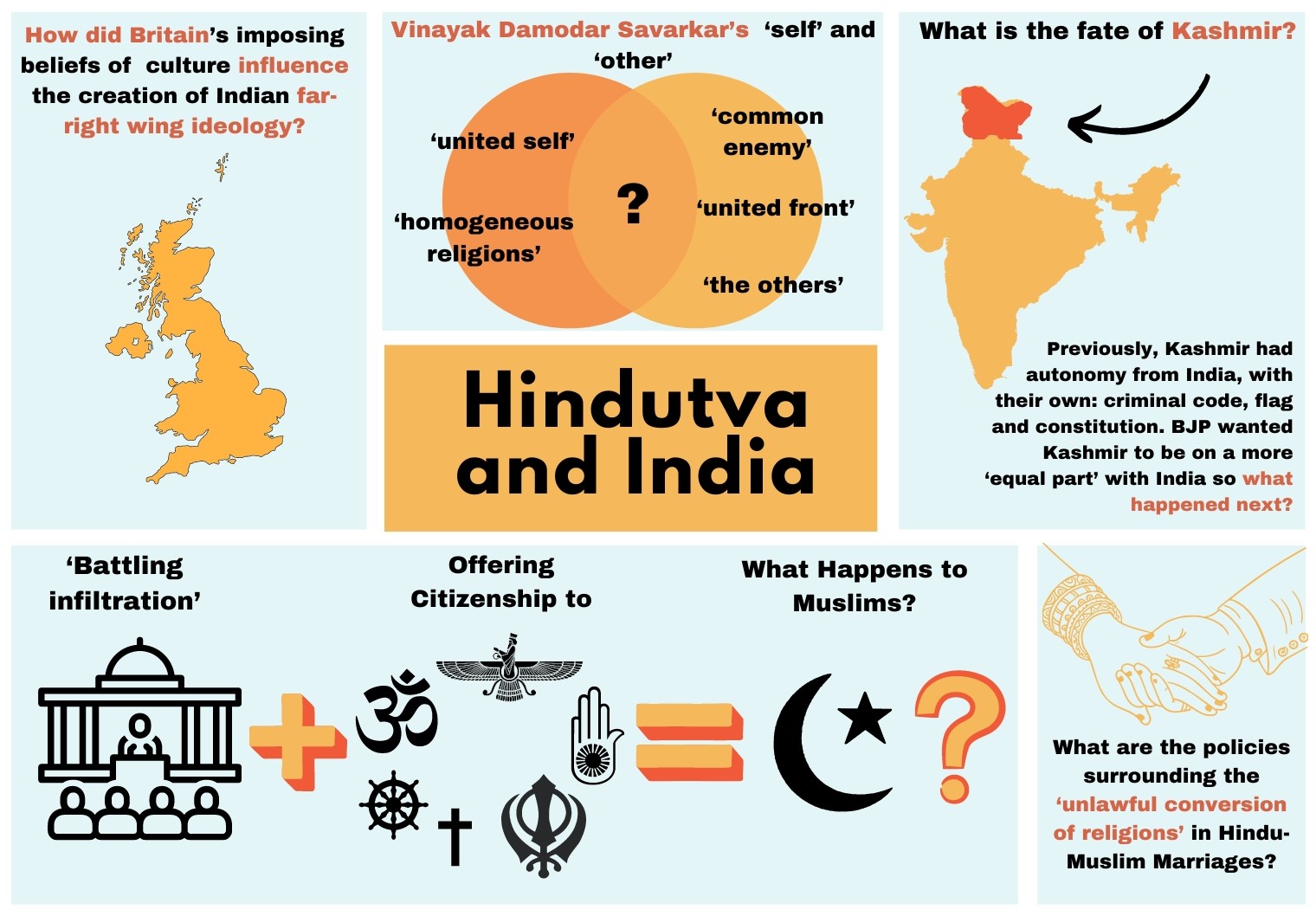Sofia Jefcoate*

This article aims to explore and explain what Hindutva is and is not, where it originates from and the impact it has on modern Indian politics. There is a specific focus on the amendments to the national citizenship law, revocation of autonomy granted to Kashmir and regulations between interfaith Hindu-Muslim marriages. Also, there is a brief discussion on the two-part concept of ‘self’ and ‘other’ introduced by Vinayak Damodar Savarkar who was the first to introduce the term Hindutva and a prominent figure to introduce Hindu nationalism (Fair, 2023).
Hindutva as understood today, is an ideology where ‘Hinduism’ is not determined by religious affiliation but by nationality, culture and race (“The Politics of Hindutva in India,” 2020). The ideology is associated with the Hindu right, represented by the political party Bharatiya Janata Party (BJP), which translates to Indian People’s Party (Sharma, 2020). It has gained popularity since the rise of Prime Minister Narendra Modi who won his first election in 2014 (About Narendra Modi, 2024) and has an ethno-nationalistic belief that ethnicity is a core component and principle of India. Therefore, PM Modi believes India should have a common culture, language, religion and history (Leidig, 2020).
It is believed Hindutva formed as a result of British colonization. From 1871 Britain required all Indians to fill out a census which asked which singular religion they belonged to. This was misaligned with Indian culture whereby someone could belong to more than one religion for example Hinduism and Buddhism. There was also no separation between religion and culture at the time in India. To circumnavigate the imposing Western ideology and as a form of political resistance to being forced to have a separate culture and religion, the idea of ‘Hindutva’ was formed to express culture whilst Hinduism described religion. Post independence Hindutva evolved into a form of nationalism (Babur & Akhtar, 2021).
In modern times Hindutva and Hinduism have grown in increasingly polarized directions with key differences regarding beliefs as to what defines India and how India’s past was experienced by individuals.
Hindus believe that India is defined by territorial area therefore anyone from within the defined region is Indian regardless of religion and therefore everyone is equal. This was upheld in the law for 50 years following Independence from Britain after Indians consistently voted to remain secular to ensure equal rights for everyone regardless of religion (Vajpeyi, 2024). They generally also believe that Muslims and Hindus struggled together against the British. On the other hand, people who follow Hindutva ideology believe that voting for all religions to be equal is ‘secular erosion’ and is a form of Hindu oppression. They believe this Hindu oppression has been consistent throughout history with India being under Muslim and Christian rule from 1200-1947. They also believe that Britain colonizing India was only a brief interlude in the conflict between Hindus and Muslims (Sharma, 2020).
So, what does this mean for Indian politics in the 21st Century? Hindutva gained popularity and so PM Modi was voted in. Over the course of PM Modi’s term, Hindutva has had a key influence in three main policy changes: amendments to the national citizenship law, revocation of autonomy granted to Kashmir and regulations between interfaith Hindu-Muslim marriages.
Changes to the National Citizenship Law have come under the Citizenship Amendment Act (CAA) which was passed in 2019 and was only started to be enforced in March 2024. The CAA changed the law so that illegal immigrants can gain Indian citizenship if they are Hindu, Sikh, Buddhist, Jain, Parsi or Christian and from Afghanistan, Pakistan or Bangladesh and escaping persecution (BBC, 2019b). This law is controversial and has been labeled ‘anti-Muslim’ by some because Muslim migrants aren’t included despite their persecution, for example, Rohynigan Muslims from Myanmar or Hazara Muslims from Afghanistan (Singh, 2024). This has upset many Indians as they argue it violates Article 14 in the Indian Constitution “The State shall not deny to any person equality before the law or the equal protection of the laws within the territory of India”.
Further to this, the Indian government plans to update the National Citizenship Register (NCR). The NCR is a form of census containing a list of all Indian citizens with their personal details such as religion (Government of Assam, n.d.). In his 2019 manifesto under the heading ‘battling infiltration,’ PM Modi stated there had been huge cultural and linguistic changes in areas of India, especially in north-eastern regions, due to illegal immigration which was having an adverse impact on people’s livelihoods. Therefore the NRC will be implemented in these areas as a priority and then phased in at a later stage into other areas of the country (Modi, 2019). Following the announcement in 2019 made by the Home Minister, India Amit Shah, about the CAA where he said ‘You must assume the NRC is to come and that every infiltrator will be expelled before the next election’, PM Modi made an address after an outbreak of protests where he stated the NRC was only implemented in Assam (a state in north-east India) under the directive of the Supreme Court (Patel, 2024).
Combining the CAA and the NRC has the potential to mean that illegal immigrants from the selected ethnic minorities, who are now protected under the CAA, could gain legal citizenship and avoid being deported whilst Muslims would be unable to gain citizenship and would then be deported. However, surrounding countries have said they will not take people who have been deported so people who have been arrested or will be arrested under the CAA will be detainees for an indefinite amount of time (BBC, 2019a).
An explanation for this is the two-part concept of ‘self’ and ‘other’ introduced by Vinkayak Damodar Savarkar – who was the first to introduce the term Hindutva and a prominent figure in introducing Hindu nationalism (Fair, 2023)-. The first part of the concept is demonstrated by allowing religions that are ‘more amenable to Hindu culture’ citizenship under the CAA as they could eventually be absorbed by Hinduism and homogenize religion within India creating a united ‘self’. The second tier is that granting these minorities citizenship will create a united front against Muslims, whom Savarkar preached as the ‘others’ or a common enemy (Babur & Akhtar, 2021).
A second key policy influenced by Hindutva is BJP revoking Article 370 in 2019 which granted Kashmir – a Muslim majority region long disputed region between PakistanUnited self
and India (Ali et al., 2019) – special rights and autonomy from the rest of India. This included having its own constitution, flag and criminal code (Al Jazeera, 2023). However, PM Modi said Article 370 was to be scrapped in order to be “on equal parts with the rest of India” (Al Jazeera, 2024) and Chief Justice Dhananjaya Yeshwant Chandrachud stated ‘Article 370 was an interim arrangement due to war conditions in the state.’(Sebastian, 2023).
A final policy influenced by Hindutva was the introduction of the ‘Unlawful Conversion of Religious Ordinance 2020’. There has been stigma and tension surrounding interfaith couples in India for many years, however, the introduction of this new law means that now interfaith marriages can only occur if both families have given full consent and the district magistrate has given its approval. The reason for these restrictions is because the BJP claims that these marriages are ‘love jihad’ which is a far-right theory that Muslim men are converting Hindu women by marriage (Kuchay, 2020). This would go against Hindutva because it would hinder the Hindu state of the nation.
In conclusion, Hindutva is a right-wing ideology that originates from political resistance to British colonial rule and the separation between culture and religion. However, Hinduism and Hindutva have now grown far apart and represent two differing belief systems. Over the past ten years, Hindutva has rapidly increased in popularity and has played a major role in Indian politics. The key changes Hindutva has produced in India are the changes to: the National Citizenship Law, the National Register for Citizens, Prohibition of Unlawful Conversion of Religion Ordinance and Article 370 regarding Kashmir’s autonomy. Influencing: politics, religion, culture, social identities and family, Hindutva has had a profound impact in sculpting India’s modern identity and core.
*Sofia Jefcoate is a research associate at HDFF.
References
About Narendra Modi. (2024). Bharatiya Janata Party. https://www.bjp.org/shri-narendra-modi
Al Jazeera. (2023, December 11). What’s Article 370? What to know about India top court verdict on Kashmir. Al Jazeera. https://www.aljazeera.com/news/2023/12/11/whats-article-370-what-to-know-about-india-top-court-verdict-on-kashmir
Al Jazeera. (2024). Modi makes rare pre-election Kashmir trip, but struggles to “win hearts.” Al Jazeera. https://www.aljazeera.com/news/2024/3/7/modi-makes-rare-pre-election-kashmir-trip-but-struggles-to-win-hearts
Ali, S., Majid, A., Kousar, S., & Abbas, F. (2019). Kashmir: The Major Source of Conflict between Pakistan and India. South Asian Studies, 34(02), 367–382. https://plantsghar.com/index.php/9/article/view/1193
Babur, A., & Akhtar, S. (2021). Hindutva and Islamophobia. Strategic Studies, 41(4), 1–16. https://www.jstor.org/stable/48732336
BBC. (2019a). Assam NRC: What next for 1.9 million “stateless” Indians?. BBC News. https://www.bbc.com/news/world-asia-india-49520593
BBC. (2019b, December 11). Citizenship Amendment Bill: India’s new “anti-Muslim” law explained. BBC News. https://www.bbc.com/news/world-asia-india-50670393
Fair, C. C. (2023). Hindutva and violence: V. D. Savarkar and the politics of history. International Affairs, 99(5), 2185–2186. https://doi.org/10.1093/ia/iiad206
Government of Assam. (n.d.). Office of the State Coordinator of National Registration (NRC), Assam. Www.nrcassam.nic.in. https://www.nrcassam.nic.in/wha_nrc.html
Kuchay, B. (2020). India police stop interfaith marriage citing “love jihad” law. Al Jazeera. https://www.aljazeera.com/news/2020/12/4/india-police-stop-interfaith-marriage-citing-love-jihad-law
Leidig, E. (2020). Hindutva as a variant of right-wing extremism. Patterns of Prejudice, 54(3), 215–237.
Modi, N. (2019). Bharatiya Janata Party. Bharatiya Janata Party. https://www.bjp.org/manifesto2019
Patel, A. (2024). So What Happens to the NRC and NPR Now? The Wire. https://thewire.in/rights/so-what-happens-to-the-nrc-and-npr-now
Sebastian, M. (2023, December 11). Article 370: India Supreme Court upholds repeal of Kashmir’s special status. Www.bbc.com. https://www.bbc.com/news/world-asia-india-67634689
Sharma, A. (2020). Asian Philosophies and Religions I. https://hwatchmediabucket.s3.amazonaws.com/wp-content/uploads/2021/04/12142408/ON-THE-DIFFERENCE-BETWEEN-Hinduism-and-Hindutva.pdf
Singh, G. (2024). Rohingya in India accuse Modi of double standards on citizenship law. Al Jazeera. https://www.aljazeera.com/news/2024/3/27/rohingya-in-india-accuse-modi-of-double-standards-on-citizenship-law
The politics of Hindutva in India. (2020). IISS, 26(7). https://www.iiss.org/en/publications/strategic-comments/2020/hindutva-politics-india/
Vajpeyi, A. (2024, April 19). Secular India or Hindu Nation: A Short History. Contending Modernities. https://contendingmodernities.nd.edu/global-currents/secular-india-hindu-nation/


Comments are closed